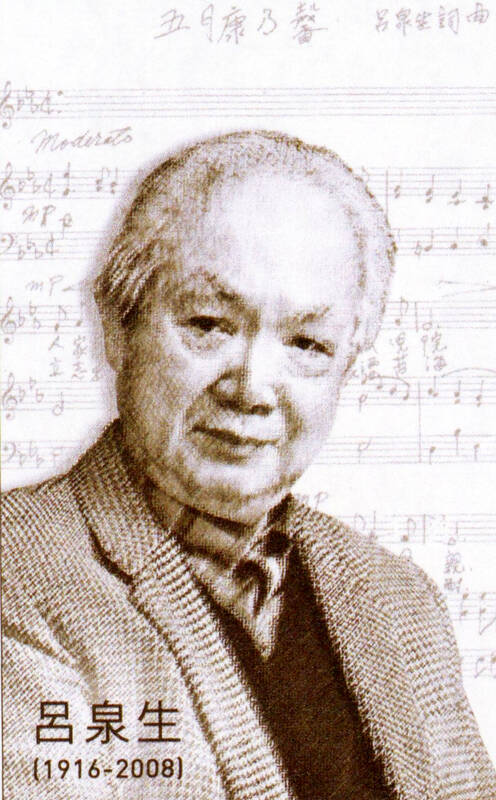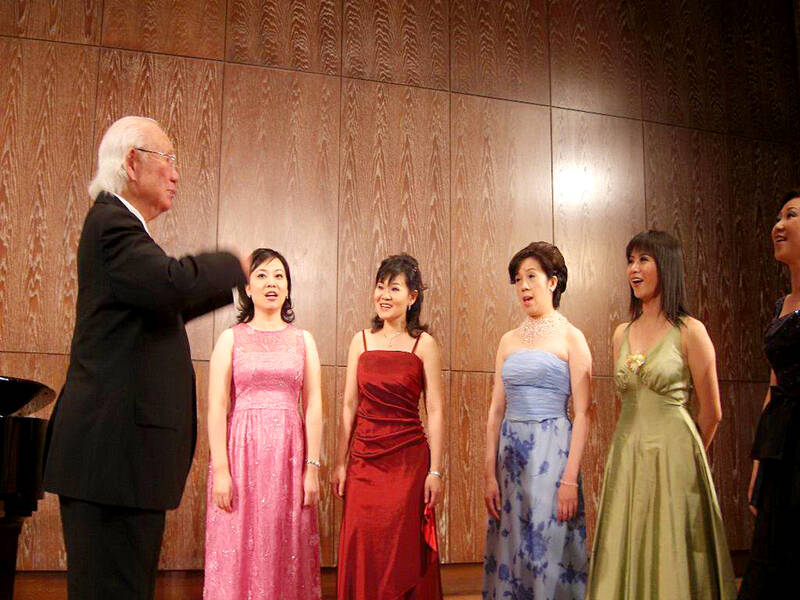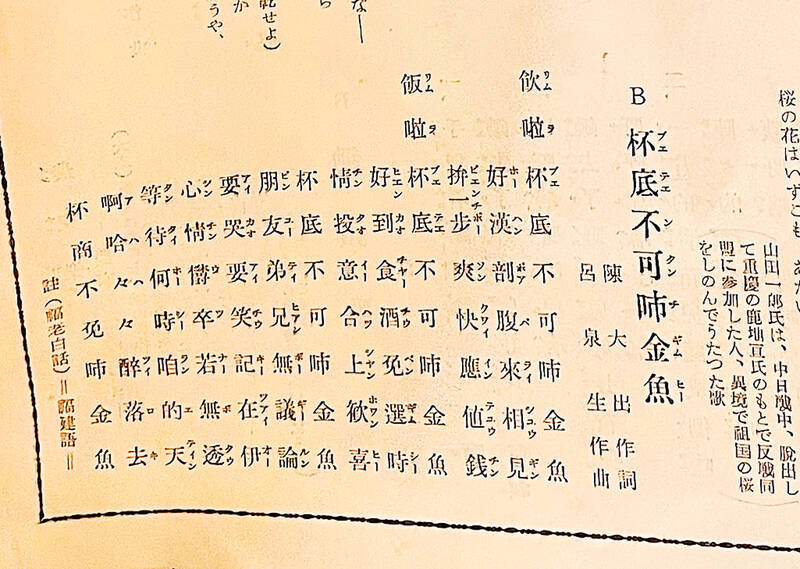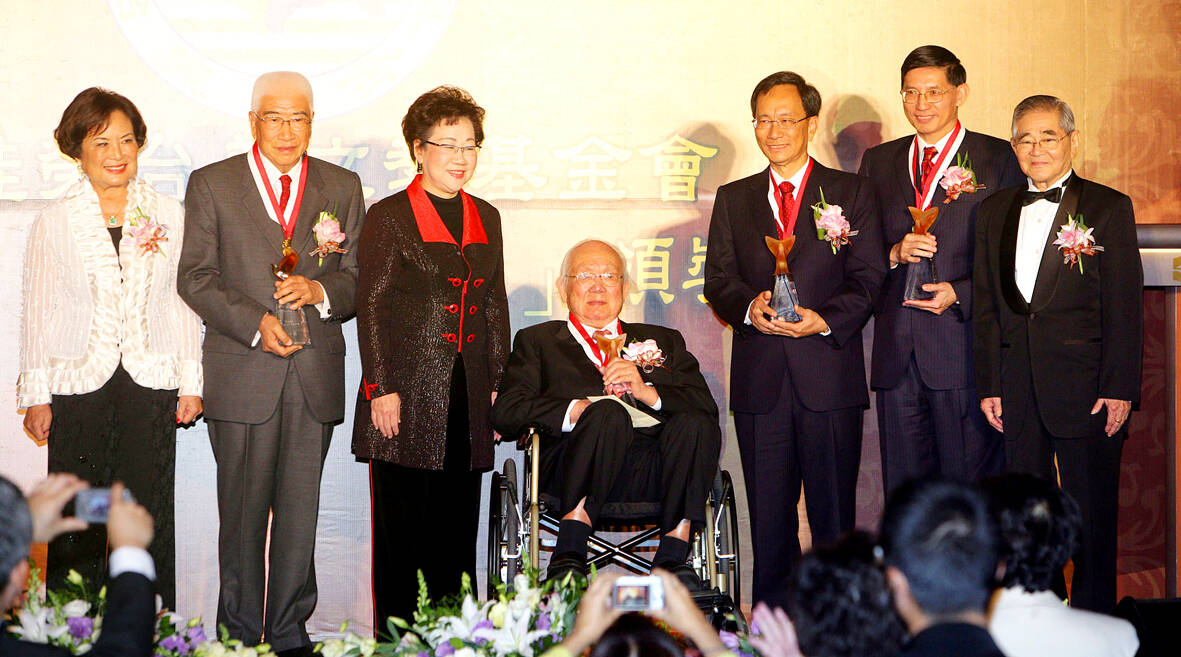June 26 to July 1
Lu Chuan-sheng (呂泉生) was working at the Taihoku Broadcasting Station on May 31, 1945, when air sirens started blaring. He and some colleagues hid in a nearby shelter, but they decided it was too dirty and moved to a different one. Minutes later, Allied bombers completely destroyed the first shelter.
Having narrowly escaped death, Lu spent the rest of the day helping transport the wounded and dead to local hospitals. When the bombing stopped, he thought of his nearly three-month-old son, who he had sent to his hometown in Taichung along with his mother a week earlier. There had been bombings every night since the baby’s birth; even the hospital was hit shortly after they were discharged.

Photo courtesy of Chunghwa Post Award
Lu could see a corner of the governor-general’s office (today’s Presidential Office Building) in flames as he headed home that day; the attack is known today as the Taipei Air Raid. He wondered if his son missed him and wanted to be held by him. On June 5, Lu visited his father-in-law, pastor Hsiao An-chu (蕭安居), and asked him to write the lyrics for a lullaby.
There were electricity restrictions then, and working virtually in the dark, he finished Rock a Baby Song (搖嬰仔歌). Lu had some musicians practice it, and broadcast it on the station on June 16. The Hoklo (commonly known as Taiwanese) tune became one of the composer and educator’s best known songs, popular even among Chinese in Southeast Asia. The lyrics were later altered under government censorship and translated into Mandarin.
Aside from his original work, Lu is also known for collecting and rearranging a number of Taiwanese folk songs, including the famous Diu Diu Deng (丟丟銅仔) from Yilan. He also helped start the esteemed Rong-Shing children’s choir (榮星合唱團) and led it from 1957 until his retirement in 1991.

Photo courtesy of Rong Shing Cultural Foundation
LIFE CHANGING ACCIDENT
Lu was born on July 1, 1916 to the prominent Xiaoyun Lu family (筱雲呂家) in today’s Shengang District (神岡) in Taichung. His father and uncle were avid musicians, and at the age of 8, his Christian family encouraged him to join the local church choir.
On a school trip to Tokyo, Lu attended his first concert, and was so moved that he decided to devote his life to music. After returning, his parents bought him a violin and he spent so much time playing it that he had to repeat a year due to missing too many classes.

Photo: CNA
Lu learned piano from his sister’s friend Chen Hsin-chen (陳信貞), who ran a music academy for women. As the only male student, he could only go there on Saturdays after all the females had left, but he learned quickly.
After graduation, his family hoped that he either became a pastor, doctor or lawyer. But Lu insisted on music. His parents were supportive, and at the age of 19 he moved to Japan to study piano at today’s Tokyo College of Music.
Lu’s dream of becoming a concert pianist was shattered when he slipped on a patch of ice in the halls of his dorm and fell down a flight of stairs. He dislocated his wrist and seriously damaged his fingers. But since he was also adept at singing, his professors encouraged the despondent Lu to switch to vocal performance instead, changing the course of his life.

Photo: CNA
MISSED CONNECTION
After studying composing for a few years, Lu came across an edition of the Taiwan New Minpao (台灣新民報) newspaper, which contained a poem based on Hsu Kun-chuan’s (徐坤泉) novel Lovely Nemesis (可愛的仇人). He was moved by the work and brought the paper home, and after several attempts he penned his first ever composition to the words. The composition led to a wistful story of missed connections, which are detailed in Chuang Yung-ming’s (莊永明) Lu Chuan-sheng’s Music World (呂泉生的音樂世界).
Lu came home one day to hear someone playing the song in his dormitory. He quickly learned that it was his roommate’s female cousin. Since nobody was there when she arrived, she saw the score on the piano and began playing it while she waited.
She begged Lu to give her the score, and even though Lu was embarrassed, he agreed. He looked forward to her return but she never appeared. He later learned that she contracted a lung ailment and moved to Hokkaido to recover. Five years later, Lu was surprised to hear a man whistling the song in his dorm. It was a new student who just arrived from Hokkaido, and he had picked up the tune from his neighbor, who would play it often. Lu asked for the address and he began corresponding with the cousin.
In 1940, Lu was working as an actor for the Tokyo-Takarazuka Theatre Company. He had just finished a show when staff told him someone was there to see him. Not knowing who it was, Lu told the staff to tell the visitor to wait at his dorm and headed to a post-show gathering. Only when he got home did he find out that it was the roommate’s cousin, who got fed with waiting for several hours and left.
Lu immediately wrote to apologize, but before he received her response, his father fell ill and he returned to Taiwan for 10 months. When he got back to Japan, his landlord showed him a stack of letters from Hokkaido, one telling him that they should meet in Tokyo. But Lu had to immediately return to Taiwan because his father had died. World War II worsened at that point and it became dangerous to travel to Japan, and Lu was forced to stay in Taipei.
In 1944, he received an anonymous letter from Hokkaido containing Autumn Grass, a poem by Haruo Sato. Lu then composed a melody to the poem and mailed it back. He never heard from her again.
Years later, Lu’s colleague Weng Ping-jung (翁炳榮) translated the poem into Mandarin and renamed the song Autumn Chrysanthemum (秋菊). Weng was the main lyricist for Lu’s songs during the five years they worked together.
CASTRATED CHICKEN
Despite the Kominka Movement (皇民化運動) during World War II, which sought to assimilate Taiwanese into Japanese culture, there was still space for local folk studies. Lu helped collect and rearrange several Taiwanese folk tunes during this time and published them in Taiwan Literature (台灣文學) magazine, most notably Diu Diu Dang from Yilan and June Fields (六月田水) from Chiayi.
He also started the acclaimed, all-male Housheng Choir (厚生), whose debut performance in the Shanshui Lou (山水樓) restaurant attracted more than 500 spectators. He also scored the subversive play Castrated Chicken (閹雞), which was put on by intellectuals to symbolize the castration of Taiwanese by the colonial government. They defied government regulations that all songs be sung in Japanese and featured the two aforementioned folk songs to the delight of the audience. The authorities banned further shows and soon shut the troupe down.
Lu continued working at the radio station after the war, playing government-approved Taiwanese songs. After a brief stint teaching, he helped the government edit and create music education material at a time when such resources were scarce. To promote songwriting, he launched Taiwan’s first monthly publication featuring original compositions. It ran for 99 issues, covering a wide range of genres, from choral arrangements to children’s ditties.
In 1957, Lu started the acclaimed Rong-Shing children’s choir with Koo Wei-fu (辜偉甫). Five years later, they added a “housewife choir” (renamed “women’s choir” in 1973), of which about half the members were the mothers of the young singers. Both choirs performed abroad extensively. Many stayed in the women’s choir for decades, still performing into their 60s and 70s.
Despite working with the government, Lu dreamed of a day when everyone in Taiwan could sing in their own language.
“I hope that one day, Hakkas, indigenous people and other groups can express their distinct cultural traits through their own mother languages, and I hope that these songs can develop equally alongside Mandarin,” he wrote.
Taiwan in Time, a column about Taiwan’s history that is published every Sunday, spotlights important or interesting events around the nation that either have anniversaries this week or are tied to current events.

The low voter turnout for the referendum on Aug. 23 shows that many Taiwanese are apathetic about nuclear energy, but there are long-term energy stakes involved that the public needs to grasp Taiwan faces an energy trilemma: soaring AI-driven demand, pressure to cut carbon and reliance on fragile fuel imports. But the nuclear referendum on Aug. 23 showed how little this registered with voters, many of whom neither see the long game nor grasp the stakes. Volunteer referendum worker Vivian Chen (陳薇安) put it bluntly: “I’ve seen many people asking what they’re voting for when they arrive to vote. They cast their vote without even doing any research.” Imagine Taiwanese voters invited to a poker table. The bet looked simple — yes or no — yet most never showed. More than two-thirds of those

In the run-up to the referendum on re-opening Pingtung County’s Ma-anshan Nuclear Power Plant last month, the media inundated us with explainers. A favorite factoid of the international media, endlessly recycled, was that Taiwan has no energy reserves for a blockade, thus necessitating re-opening the nuclear plants. As presented by the Chinese-language CommonWealth Magazine, it runs: “According to the US Department of Commerce International Trade Administration, 97.73 percent of Taiwan’s energy is imported, and estimates are that Taiwan has only 11 days of reserves available in the event of a blockade.” This factoid is not an outright lie — that

Former Chinese Nationalist Party (KMT) chairwoman Hung Hsiu-chu’s (洪秀柱) attendance at the Chinese Communist Party’s (CPP) “Chinese People’s War of Resistance Against Japanese Aggression and the World Anti-Fascist War” parade in Beijing is infuriating, embarrassing and insulting to nearly everyone in Taiwan, and Taiwan’s friends and allies. She is also ripping off bandages and pouring salt into old wounds. In the process she managed to tie both the KMT and the Democratic Progressive Party (DPP) into uncomfortable knots. The KMT continues to honor their heroic fighters, who defended China against the invading Japanese Empire, which inflicted unimaginable horrors on the

Sitting on a bus bound for Heping Island (和平島), at the start of my first visit to Keelung in years, I was hell-bent on visiting a place of considerable historical interest, even though I knew that it wasn’t officially open to the public. In 2011, archaeologists working in the densely populated southern half of the island unearthed the foundations of the Convento de Todos los Santos (Convent of All Saints, 諸聖教堂), a Catholic house of worship established during Spain’s 1624-1642 occupation of northern Taiwan. I’d heard about its rediscovery a while ago, but it wasn’t until I read a scholarly